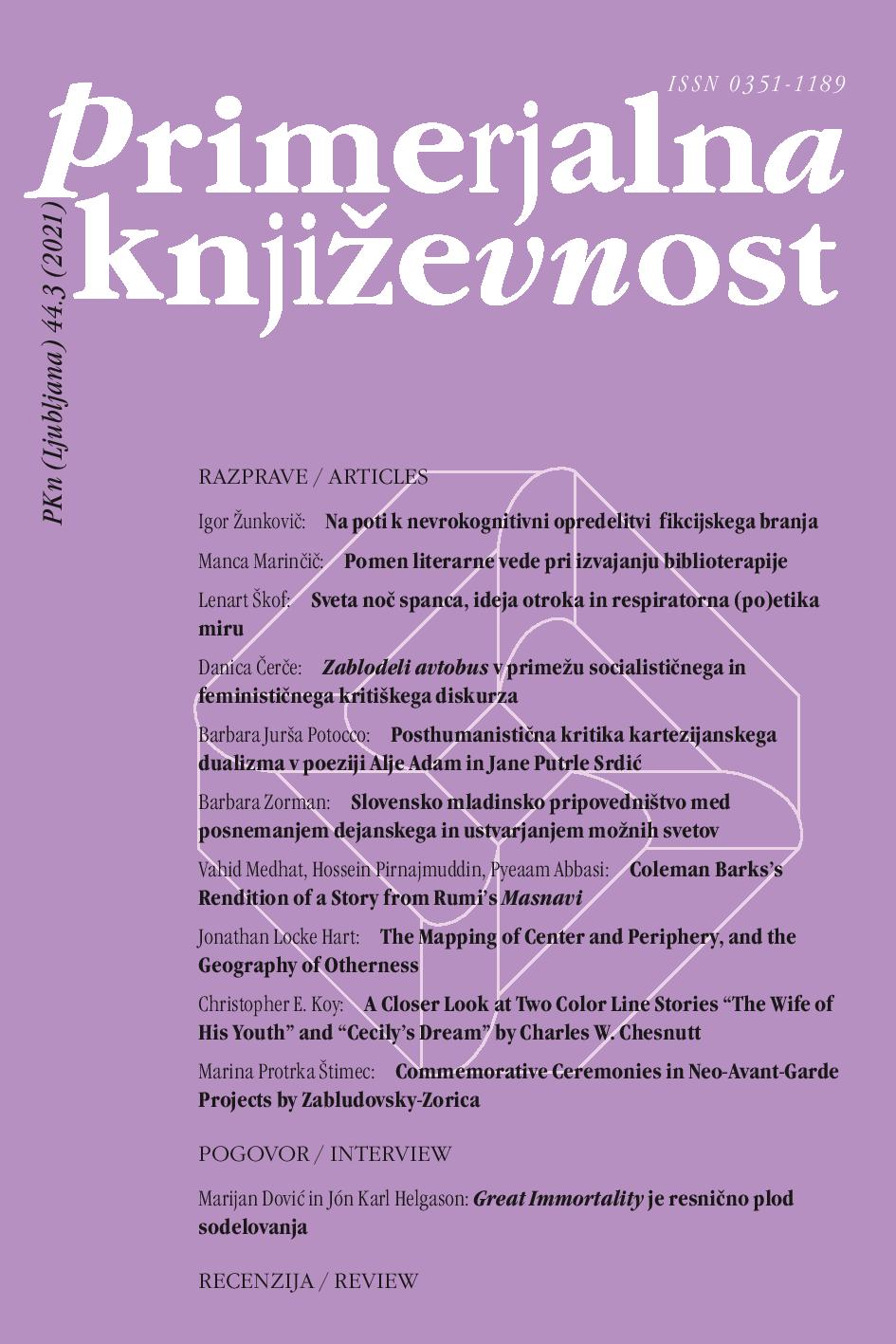Možni svetovi v prevodu: Barksova interpretacija zgodbe iz Rumijevega Masnavija
DOI:
https://doi.org/10.3986/pkn.v44.i3.07Ključne besede:
literarno prevajanje, perzijska poezija, Džalaludin Rumi: Masnavi, prevodi v angleščino, teorija možnih svetov, besedilni svet, pripovedni svet, zaplet, narativnostPovzetek
V tem članku uporabimo teorijo možnih svetov na področju prevajalskih študij pri preučevanju pripovednih svetov izvirnih in prevedenih besedil. S tem, ko opredeli možne svetove, Marie-Laure Ryan opiše notranjo strukturo besedilnega univerzuma in potek zgodbe. Na tej podlagi primerjamo eno od izvirnih zgodb Rumijevega Masnavija z angleškim prevodom Colemana Barksa. Možne svetove likov in zgodbo v obeh besedilih raziskujemo, da bi lahko ocenili stopnjo združljivosti med besedilnimi svetovi izvirnika in prevedenega besedila ter ugotovili, kako pomembno bi to lahko bilo. Preučujemo tudi, kako bralci rekonstruirajo pripovedni svet, ki ga projicira vsako besedilo. Analiza je pokazala nekatera razhajanja med prikazom besedilnih svetov v izvirnem in prevedenem besedilu ter v načinu, kako bralci rekonstruirajo pripovedne svetove obeh besedil. Ker prevodu ni uspelo celovito prikazati glavnega junaka, se delno izgubita tudi ostrina in konciznost, ki ju kaže izvirno besedilo. Pokazali smo še, da je v primerjavi s prevodom izvorno besedilo bogatejše na področju namišljenega, kar kaže na višjo stopnjo pripovedljivosti (tellability) v pripovednem svetu Masnavija.
Literatura
Chatman, Seymour. <em>Story and Discourse</em>. Ithaca, NY; London: Cornell University Press, 1978.
Doležel, Lubomir. <em>Heterocosmica: Fiction and Possible Worlds</em>. Baltimore, MD: Johns Hopkins University Press, 1998.
Eco, Umberto. <em>The Role of the Reader</em>. Bloomington, IN: Indiana University Press, 1979.
Field, Claud. “The Master Mystic.” <em>Expository Times</em> 17.10 (1906): 452–453.
Fludernik, Monika, and Greta Olson. “Assessing Current Trends in Narratology.” <em>Current Trends in Narratology</em>. Ed. Greta Olson. New York, NY; Berlin: De Gruyter, 2011. 1–35.
Halverson, Sandra L. “Cognitive Translation Studies: Developments in Theory and Method.” <em>Translation and Cognition</em>. Eds. Gregory M. Shreve and Erik Angelone. Amsterdam: John Benjamins, 2010. 349–369.
Kripke, Saul A. “Semantical Considerations on Modal Logic.” <em>Acta Philosophica Fennica</em> 16 (1963): 83–94.
Leibnitz, Gottfried W. <em>Theodicy: Essays on the Goodness of God, the Freedom of Man and the Origin of Evil</em>. Transl. E. M. Huggard. La Salle, IL: Open Court Publishing, 1985.
Lewis, David. “Counterpart Theory and Quantified Modal Logic.” <em>Journal of Philosophy</em> 65.5 (1968): 113–126.
Lewis, Franklin. <em>Rumi: Past and Present, East and West. The Life, Teaching and Poetry of Jalal al-din Rumi</em>. Oxford; New York, NY: Oneworld Publications, 2001.
Lewis, Franklin. <em>Rumi: Swallowing the Sun. Poems Translated from the Persian</em>. Oxford; New York, NY: Oneworld Publications, 2008.
Munoz Martin, Ricardo. “On Paradigms and Cognitive Translatology.” <em>Translation and Cognition</em>. Eds. Gregory M. Shreve and Erik Angelone. Amsterdam: John Benjamins, 2010. 169–187.
Nicholson, Reynold A. <em>The Mathnawi of Jalaluddin Rumi</em>. 3 vol. Cambridge: Cambridge University Press, 1925–1926.
Nünning, Ansgar. “Narratology or Narratologies? Taking Stock of Recent Developments, Critique and Modest Proposals for Future Usages of the Term.” <em>What Is Narratology? Questions and Answers Regarding the Status of a Theory</em>. Eds. Tom Kindt and Hans H. Müller. New York, NY; Berlin: De Gruyter, 2003. 239–276.
Palmer, Alan. <em>Fictional Minds</em>. Lincoln, NE; London: University of Nebraska Press, 2004.
Pavel, Thomas G. <em>Fictional Worlds</em>. Cambridge, MA; London: Harvard University Press, 1986.
Rescher, Nicholas. “The Ontology of the Possible.” <em>Logic and Ontology</em>. Ed. Milton Munitz. New York, NY: New York University Press, 1973. 166–181.
Rimmon-Kennan, Shlomith. <em>Narrative Fiction: Contemporary Poetics</em>. Second edition. London; New York, NY: Routledge, 1989.
Risku, Hanna. “Cognitive Approaches to Translation.” <em>The Encyclopedia of Applied Linguistics</em>. Ed. Carol A. Chapelle. Oxford: Wiley-Blackwell, 2012. 1–10.
Rojo, Ana, and Iraide Ibarretxe-Antunano. “Cognitive Linguistics and Translation Studies: Past, Present, and Future.” <em>Cognitive Linguistics and Translation: Advances in Some Theoretical Models and Applications</em>. Application of Cognitive Linguistics 23. Eds. Ana Rojo and Iraide Ibarretxe-Antunano. New York, NY; Berlin: De Gruyter, Mouton, 2013. 3–30.
Ryan, Marie-Laure. <em>Possible Worlds, Artificial Intelligence and Narrative Theory</em>. Bloomington, IN: Indiana University Press, 1991.
Ryan, Marie-Laure. “Fictional Worlds in Digital Age.” <em>A Companion to Digital Literary Studies</em>. Eds. Ray Siemens and Susan Schreibman. Oxford: Blackwell, 2008. 250–266.
Schimmel, Annemarie. <em>Rumi’s World: The Life and Works of the Greatest Sufi Poet</em>. Boston, MA: Shambhala, 2001.
Semino, Elena. “Possible Worlds and Mental Spaces in Hemingway’s ‘A Very Short Story’.” <em>Cognitive Poetics in Practice</em>. Eds. Joanna Gavins and Gerard Steen. London; New York, NY: Routledge, 2003. 83–98.
Semino, Elena. “Text Worlds.” <em>Cognitive Poetics: Goals, Gains and Gaps</em>. Application of Cognitive Linguistics 10. Eds. Geert Brone and Jeroen Vandale. New York, NY; Berlin: De Gruyter, Mouton, 2009. 34–71.
Shamisa, Siroos. <em>Literary Genres</em>. Tenth edition. Tehran: Ferdos Publication, 2004.
Sharifian, Farzad. <em>Cultural Conceptualisations and Language: Theoretical Framework and Applications</em>. Amsterdam; Philadelphia, PA: John Benjamins Publishing, 2011.
Stockwell, Peter. <em>Cognitive Poetics: An Introduction</em>. London; New York, NY: Routledge, 2001.
Tabakowska, Elżbieta. <em>Cognitive Linguistics and Poetics of Translation</em>. Tübingen: Gunter Narr, 1993.


